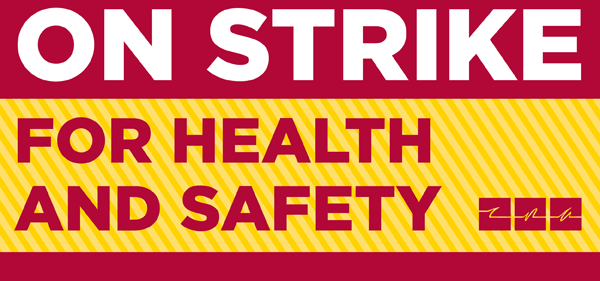Press Release
RN Ebola Strike, National Day of Action for Ebola Safety Standards Coast to Coast Nov. 12

Actions Include Strike by 18,000 Kaiser California RNs, Strike by Washington DC RNs, Events in at Least 14 States
Registered nurses from California to Maine will hold strikes, picketing, and other actions Wednesday, November 12 in 14 U.S. states and the District of Columbia – with possible support actions globally – as National Nurses United, the largest U.S. organization of nurses steps up the demand for tougher Ebola safety precautions in the nation’s hospitals.
One centerpiece of the actions will be a two-day strike by 18,000 RNs and nurse practitioners at 66 Kaiser Permanente hospitals and clinics who have been pressing the HMO giant for weeks to put in place proper safety protocols and training with optimal personal protective equipment. Kaiser has repeatedly dismissed the nurses’ concerns. In California alone, strikes, pickets and other actions will involve at least 50,000 RNs.
A strike will also occur at Providence Hospital in Washington D.C. affecting 400 RNs.
In addition, Ebola safety actions are tentatively set for Augusta, Ga., Bar Harbor, Me., Boston, Chicago, Durham, N.C., Houston, Kansas City, Las Vegas, Lansing, Mi., Massilon, Oh., Miami, St. Louis, St. Paul, Mn., St. Petersburg, Fl., and Washington DC, as well as a number of other California locations. Additional details on exact sites of the actions will be announced soon.
NNU says it anticipates actions in many other states as well, as nurses are contacting NNU across the country and it is highly likely the national day of action will spread widely.
“Nurses, who have been willing to stand by the patients whether it's the flu, whether it's Ebola, whether it's cancer, are now being asked to put themselves in harm's way unprotected, unguarded," said NNU Executive Director Rose Ann DeMoro, in a press conference announcing the actions.
“Every RN is one patient away from being exposed to Ebola, the message nurses are being given across the nation is that they are expendable,” DeMoro noted. “You don’t ask the nurses to put their lives on the line and then not protect them.”
Zenei Cortez, RN, a co-president of the California Nurses Association/NNU and chair of the Kaiser nurses bargaining team, described Kaiser’s failure to enact the highest standard of Ebola safety precautions as emblematic of the HMO giant’s “model of care.”
“In this crisis, Kaiser has chosen to protect its bottom line. It is unconscionable to continue these practices. Kaiser’s model of care, denying or limiting care, is not working. We will not stand for anything less” than the optimal levels of care for patients and proper protection for patients, Cortez said.
“For far too long, Providence nurses have felt disrespected due to poor working conditions and unsafe staffing. Now, management is asking us to care for a possible Ebola patient without optimal protective equipment and training. We’re striking to protect ourselves and our patients,” said Providence RN Rose Farhoudi
What NNU is demanding is that all U.S. hospitals follow the precautionary principle in safety measures for Ebola, which holds that absent scientific consensus that a particular risk is not harmful, especially one that can have catastrophic consequences, the highest level of safeguards must be adopted.
Specifically, that means for nurses and other caregivers who interact with Ebola patients are provided the optimal personal protective equipment including full-body hazmat suits that meet the American Society for Testing and Materials F1670 standard for blood penetration, F1671 standard for viral penetration, and that leave no skin exposed or unprotected, and National Institute for Occupational Safety and Health-approved powered air purifying respirators with an assigned protection factor of at least 50.
Second, that all facilities provide continuous, rigorous interactive training for RNs and other health workers who might encounter an Ebola patient, that includes practice putting on and taking off the hazmat suits where some of the greatest risk of infection can occur.
NNU has also repeatedly called on the White House and Congress to direct all hospitals to meet these standards. “We know from years of experience that these hospitals will meet the cheapest standards, not the most effective precautions. And now we are done talking and ready to act,” DeMoro said.